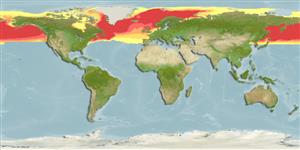>
Osmeriformes (Freshwater smelts) >
Osmeridae (Smelts)
Etymology: Mallotus: Greek for fleecy, derived from mallos = wool, and -otus = a Greek adjectival suffix referring to property; referring to the shape of the scales along the side of breeding males, appearing hairy or fleecy (S.Kullander, pers. Comm.).; villosus: From the Latin 'villosus' meaning hairy - refers to the rough extruded scales on spawning males..
Environment: milieu / climate zone / depth range / distribution range
Ecologia
marinhas; Água doce; estuarina; anádromo (Ref. 46888); intervalo de profundidade 0 - 725 m (Ref. 58426), usually ? - 200 m (Ref. 96339). Polar; 84°N - 37°N, 180°W - 180°E (Ref. 54574)
Circumpolar in the Arctic. North Atlantic: Barents Sea up to Bear Island, in the White and Norwegian seas, off the coast of Greenland up to 74°N and from Hudson Bay in Canada to Gulf of Maine, USA. North Pacific: south to Korea and Juan de Fuca Strait, Canada.
Comprimento de primeira maturação / Tamanho / Peso / Idade
Maturity: Lm 13.3, range 15 - 19 cm
Max length : 20.0 cm TL macho/indeterminado; (Ref. 11626); 25.2 cm TL (female); common length : 15.0 cm TL macho/indeterminado; (Ref. 4645); peso máx. publicado: 52.00 g (Ref. 56475); idade máx. registrada: 10 anos (Ref. 72498)
Espinhos dorsais (total): 0; Raios dorsais (total): 10-14; Espinhos anais 0; Raios anais : 16 - 23; Vértebras: 62 - 73. Adipose with long base, about 1.5 times as long as the orbit or longer, outer margin only slightly curved (Ref. 6885). Olive green on dorsal surface, merging into silvery on sides and ventral surface (Ref. 6885).
Oceanic species found in schools (Ref. 2850). Nerito-pelagic (Ref. 58426); however, reported at 1086 m Davis Strait to southern Baffin Bay (Ref. 120413). Adults feed on planktonic crustaceans, copepods, euphausiids, amphipods, marine worms, and small fishes (Ref. 6885, 35388). Mature individuals move inshore in large schools to spawn (Ref. 2850). In the spring large spawning shoals migrate toward the coasts, males usually arrive first. Often entering brackish and freshwater (Ref. 37812). Semelparous (Ref. 51846). Produces 6,000-12,000 adhesive eggs. Females are valued for their roe, males are utilized as fishmeal. Marketed canned and frozen; eaten fried and dried (Ref. 9988). Possibly to 725 m depth (Ref. 6793).
Reproductive strategy: synchronous ovarian organization, determinate fecundity (Ref. 51846). Experimental testing suggests facultative semelparity, with offshore-spawning capelin being absolute semelparous (death of both genders) and beach-spawning capelin being iteroparous irrespective of sex (Ref. 92136). Also Ref. 92150.
Eschmeyer, W.N., E.S. Herald and H. Hammann, 1983. A field guide to Pacific coast fishes of North America. Boston (MA, USA): Houghton Mifflin Company. xii+336 p. (Ref. 2850)
Status na Lista Vermelha da UICN (Ref. 130435)
Ameaça para os humanos
Harmless
Uso pelos humanos
Pescarias: altamente comercial
Ferramentas
Relatórios especiais
Baixar XML
Fontes da internet
Estimates based on models
Preferred temperature (Ref.
123201): 0.3 - 7.1, mean 2.7 °C (based on 956 cells).
Índice de diversidade filogenética (Ref.
82804): PD
50 = 1.0000 [Uniqueness, from 0.5 = low to 2.0 = high].
Bayesian length-weight: a=0.00363 (0.00290 - 0.00455), b=3.21 (3.14 - 3.28), in cm total length, based on LWR estimates for this species (Ref.
93245).
Nível Trófico (Ref.
69278): 3.2 ±0.1 se; based on diet studies.
Resiliência (Ref.
120179): médio(a), tempo mínimo de duplicação da população 1,4 - 4,4 anos (K=0.3-0.5; tm=3; tmax=10; Fec=6,000).
Prior r = 0.41, 95% CL = 0.27 - 0.62, Based on 9 stock assessments.
Fishing Vulnerability (Ref.
59153): Low to moderate vulnerability (27 of 100).
Climate Vulnerability (Ref.
125649): Low vulnerability (24 of 100).
Nutrients (Ref.
124155): Calcium = 61.5 [23.6, 173.6] mg/100g; Iron = 0.789 [0.272, 2.351] mg/100g; Protein = 16.4 [15.2, 17.5] %; Omega3 = 0.546 [0.230, 1.330] g/100g; Selenium = 13.4 [4.3, 35.4] μg/100g; VitaminA = 21.6 [4.0, 119.8] μg/100g; Zinc = 0.682 [0.407, 1.150] mg/100g (wet weight); based on
nutrient studies.
